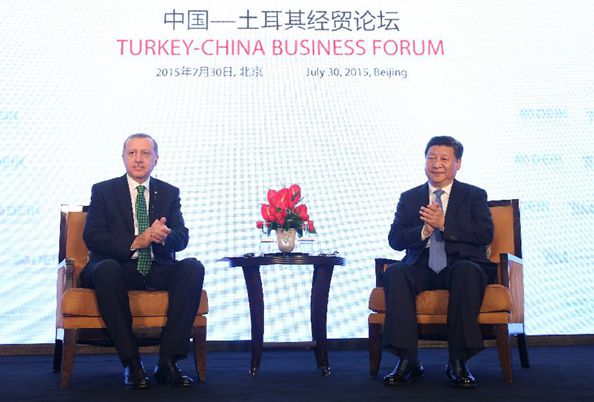Erdo?an in China
- By Tim Collard
 0 Comment(s)
0 Comment(s) Print
Print E-mail China.org.cn, July 31, 2015
E-mail China.org.cn, July 31, 2015
|
|
|
Chinese President Xi Jinping (R) and his Turkish counterpart Recep Tayyip Erdo?an attend the China-Turkey Business Forum in Beijing, capital of China, July 30, 2015. [Xinhua/Pang Xinglei] |
The Turkish President Recep Tayyip Erdo?an has been in China this week for a state visit, in which he has conferred with President Xi Jinping. The ostensible focus of the visit has been on trade; Mr Erdo?an brought with him a 100-strong Turkish business delegation, in the hope of further improving a commercial relationship currently worth US$24 billion per year, though Turkey has a considerable trade deficit which both sides will want to redress. Three agreements were signed on developing trade and promoting and protecting bilateral investment.
Turkish hopes in this direction derive strength from China's firmly-established plans to open trade routes across the Asian landmass between China, Europe and the Middle East – the Belt and Road initiatives. Turkey has already joined the China-led Asian Infrastructure Investment Bank (AIIB) as a founding member. And Turkey has already become the beneficiary of Chinese infrastructural technology; last year the high-speed rail link between Istanbul and the capital Ankara was opened, built with Chinese technology and largely Chinese finance. The Turkish railway administration has promised US$45 billion of investment in rail over the next few years, and China is now well-placed to take part in this program.
But there are wider implications. President Erdo?an is conscious that Turkey is currently in a difficult situation as regards security in her own region, and wishes to strengthen Turkey's position by broadening the range of the country's relationships in the security as well as in the economic field. Turkey and China are both members of the G20 troika for the current and the coming year, and are thus in constant dialogue over global issues. Bilaterally, there has been talk at various times of the possible purchase of a Chinese long-range missile system, but this is not yet a done deal. Though a Chinese company has been named as "preferred bidder," Erdo?an mentioned in an interview with Xinhua that "impediments" to the deal still remain.






